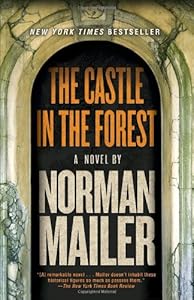Did a lot of walking yesterday. Perhaps I am spending too much time walking but it is the best way to pass the time while listening to an audiobook. I just finished listening to Norman Mailer‘s “The Castle in the Forest“. “Der Waldschloss” was a term used in this fictional account, at the very least, by some of the jewish prisoners at some concentration camp during World War II. It was meant to be ironic. To say their home in the woods was not a prison but a castle was an attempt at preserving a bit of humor after having had all other luxuries taken from them.

Cover of The Castle in the Forest: A Novel
The book transports you to pre-World War Imperial Austria. I found myself listening to the narrator wondering what of the story was dredged up from Mailer’s own meandering mind and what came from his research of Adolph Hitler‘s actual forebears and childhood. His main character, a demon, inhabits the minds of some variously perverse old world Austrian ancestors to Hitler. While doing so the demon describes their inner thoughts and weaknesses and his role in promoting and engendering their perversions in the run up to his final product, a young Hitler. How much of this is coming from the author’s own psyche and how much is he fabricating from whole cloth? Is this a window into the mind of an old Jew from Brooklyn? Does it give us some sense of how an old Jew might have demonized Hitler? After all, for Mailer Hitler was a figure that was a contemporary popular culture figure at a formative time of the author’s life. It is surprising to hear the detailed extent of this exploration of various demon-harangued minds. Mailer himself is so far removed from these people in geography and lifestyle that he must have been quite some time in the research phase of this book to understand the equipment, and daily chores that would have made up the lifestyle for these people. Understanding what would a late 19th century teenage Austrian boy really treasure, and how would he speak too his mother and father is really about understanding what could they have even *owned* and had as possibilities in their lives back then. Mailer makes some believable characters, but they still appear to be presented at arms length as a result of being only periodically inhabited by the narrating demon, as opposed to the author himself doing the inhabiting of the characters, and narrating the story from their perspective. So one never really see the world *as* Hitler, but receives reports from the demon as he is sometimes the internal viewer of the events and sometimes the external viewer in young Adi’s life.
So we learn a great deal about the feelings and stresses of being a mid-level demon. This part Mailer certainly *has* made up whole cloth and I think he has done a wonderful job. Mailer’s creativity is a force of detailed exposition. The intricate methods of ‘The Maestro’ and his henchmen are the kind of ingenuity that make for great fantasy or science fiction. Demons are henchmen forced to do the bidding of ‘The Maestro’ and are required to inhabit the minds of their ‘clients’. The idea that performing the Devil’s work has a certain fiscal consequence that has to be accounted for is hilarious. But they are capable of a few other interesting tricks. They can inhabit food, such as honey. They can etch new dreams for their clients as well as review past events witnessed by fellow demons as if they themselves were there. Some of the temptations and abilities of the demons have analogues with modern living. We are certainly still struggling with some of the same temptations as we always have been. But the non-local awareness aspects of the demon’s abilities does remind one of the voyeuristic capabilities of modern communications and social networks. We can all now monitor to a greater or lesser degree various people from within and without or own social circles. Who influences who and to what purpose is always debatable.

English: Norman Mailer, Miami Book Fair International, 1988 (Photo credit: Wikipedia)
The book gives the Hitler family a long history of perversion as if to make the boy Hitler an unwitting sum of families poor breeding. As if to say he is so evil, he cannot be a normal man, he must have required great preparation, such that the end result was almost inevitable. It makes a great story. And to be honest, listening to the audiobook on Halloween, riding Strassenbahn 1 from the 5th district in Vienna through the Ringstrasse to the Hundertwasserhaus was wonderfully creepy. It made me suspicious of who might be inhabiting the various characters on the tram with me that night. Isn’t this what a good book is supposed to do? It makes you look at the world around you and wonder if its not quite another world than what you thought it was before you started the book. If you are a fan of this period of history already, Mailer’s The Castle In The Forest is great for that purpose. Here’s a link to a sample from the audiobook


You must be logged in to post a comment.